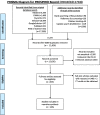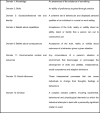The psychological and behavioural factors associated with laypeople initiating CPR for out-of-hospital cardiac arrest: a systematic review
- PMID: 36639764
- PMCID: PMC9840280
- DOI: 10.1186/s12872-022-02904-2
The psychological and behavioural factors associated with laypeople initiating CPR for out-of-hospital cardiac arrest: a systematic review
Abstract
Background: Prompt, effective CPR greatly increases the chances of survival in out-of-hospital c ardiac arrest. However, it is often not provided, even by people who have previously undertaken training. Psychological and behavioural factors are likely to be important in relation to CPR initiation by lay-people but have not yet been systematically identified.
Methods: Aim: to identify the psychological and behavioural factors associated with CPR initiation amongst lay-people.
Design: Systematic review Data sources: Cochrane Library, MEDLINE, EMBASE, CINAHL, PsycInfo and Google Scholar.
Study eligibility criteria: Primary studies reporting psychological or behavioural factors and data on CPR initiation involving lay-people published (inception to 31 Dec 2021).
Study appraisal and synthesis methods: Potential studies were screened independently by two reviewers. Study characteristics, psychological and behavioural factors associated with CPR initiation were extracted from included studies, categorised by study type and synthesised narratively.
Results: One hundred and five studies (150,820 participants) comprising various designs, populations and of mostly weak quality were identified. The strongest and most ecologically valid studies identified factors associated with CPR initiation: the overwhelming emotion of the situation, perceptions of capability, uncertainty about when CPR is appropriate, feeling unprepared and fear of doing harm. Current evidence comprises mainly atheoretical cross-sectional surveys using unvalidated measures with relatively little formal testing of relationships between proposed variables and CPR initiation.
Conclusions: Preparing people to manage strong emotions and increasing their perceptions of capability are likely important foci for interventions aiming to increase CPR initiation. The literature in this area would benefit from more robust study designs.
Systematic review registration: PROSPERO: CRD42018117438.
Keywords: Behavioural; Bystander; CPR; Laypeople; Out-of-hospital cardiac arrest; Psychological; Systematic review.
© 2023. The Author(s).
Conflict of interest statement
The authors declare that they have no competing interests.
Figures
Similar articles
-
Assessment of Community Interventions for Bystander Cardiopulmonary Resuscitation in Out-of-Hospital Cardiac Arrest: A Systematic Review and Meta-analysis.JAMA Netw Open. 2020 Jul 1;3(7):e209256. doi: 10.1001/jamanetworkopen.2020.9256. JAMA Netw Open. 2020. PMID: 32609351 Free PMC article.
-
Lay Bystanders' Perspectives on What Facilitates Cardiopulmonary Resuscitation and Use of Automated External Defibrillators in Real Cardiac Arrests.J Am Heart Assoc. 2017 Mar 13;6(3):e004572. doi: 10.1161/JAHA.116.004572. J Am Heart Assoc. 2017. PMID: 28288975 Free PMC article.
-
Impact of dispatcher-assisted cardiopulmonary resuscitation on neurologically intact survival in out-of-hospital cardiac arrest: a systematic review.Scand J Trauma Resusc Emerg Med. 2021 May 24;29(1):70. doi: 10.1186/s13049-021-00875-5. Scand J Trauma Resusc Emerg Med. 2021. PMID: 34030706 Free PMC article.
-
In patients with out-of-hospital cardiac arrest, does the provision of dispatch cardiopulmonary resuscitation instructions as opposed to no instructions improve outcome: a systematic review of the literature.Resuscitation. 2011 Dec;82(12):1490-5. doi: 10.1016/j.resuscitation.2011.09.004. Epub 2011 Sep 16. Resuscitation. 2011. PMID: 21925129 Review.
-
Cardiopulmonary resuscitation (CPR) plus delayed defibrillation versus immediate defibrillation for out-of-hospital cardiac arrest.Cochrane Database Syst Rev. 2014 Sep 12;2014(9):CD009803. doi: 10.1002/14651858.CD009803.pub2. Cochrane Database Syst Rev. 2014. PMID: 25212112 Free PMC article. Review.
Cited by
-
The Real Experience of Lay Responders Performing Cardiopulmonary Resuscitation: A Synthesis of Qualitative Evidence.Public Health Rev. 2024 Jun 5;45:1606650. doi: 10.3389/phrs.2024.1606650. eCollection 2024. Public Health Rev. 2024. PMID: 38903868 Free PMC article. Review.
-
Moving towards health promoting schools: effectiveness of an educational intervention to improve knowledge, attitude and beliefs regarding heart attack, and CPR knowledge in high school students in Lebanon.Front Public Health. 2024 May 30;12:1355766. doi: 10.3389/fpubh.2024.1355766. eCollection 2024. Front Public Health. 2024. PMID: 38873300 Free PMC article.
-
Nurses' motivation for performing cardiopulmonary resuscitation: a cross-sectional study.BMC Nurs. 2024 Mar 15;23(1):181. doi: 10.1186/s12912-024-01853-9. BMC Nurs. 2024. PMID: 38486281 Free PMC article.
-
Voluntary first responders' experiences of being dispatched to suspected out-of-hospital cardiac arrest in rural areas: an interview study.BMC Cardiovasc Disord. 2024 Mar 14;24(1):157. doi: 10.1186/s12872-024-03826-x. BMC Cardiovasc Disord. 2024. PMID: 38486144 Free PMC article.
-
Assessing the quality of chest compressions with a DIY low-cost manikin (LoCoMan) versus a standard manikin: a quasi-experimental study in primary education.Eur J Pediatr. 2024 Aug;183(8):3337-3346. doi: 10.1007/s00431-024-05601-8. Epub 2024 May 14. Eur J Pediatr. 2024. PMID: 38740659 Free PMC article.
References
Publication types
MeSH terms
Grants and funding
LinkOut - more resources
Full Text Sources
Medical
Research Materials



